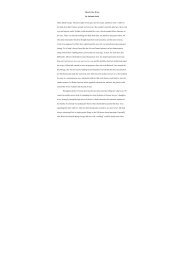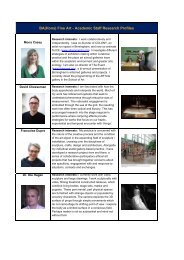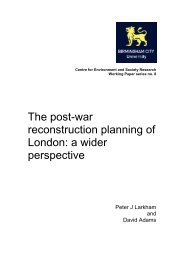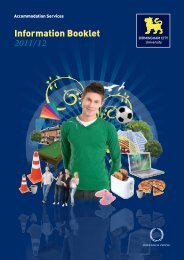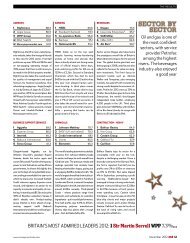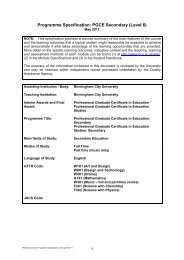Top Performance Student Success Bright Future An inspiration to us ...
Top Performance Student Success Bright Future An inspiration to us ...
Top Performance Student Success Bright Future An inspiration to us ...
Create successful ePaper yourself
Turn your PDF publications into a flip-book with our unique Google optimized e-Paper software.
12<br />
fOrMer<br />
STUdeNT<br />
reTUrNS aS<br />
PrOfeSSOr<br />
Professor Mark Radford<br />
when Professor Mark radford<br />
under<strong>to</strong>ok his degree course in 1991,<br />
he was one of j<strong>us</strong>t 15 nursing students<br />
in his year.<br />
Now Deputy Direc<strong>to</strong>r of Nursing at University<br />
Hospitals Coventry and Warwickshire, he also<br />
returns <strong>to</strong> his place of study as a visiting<br />
lecturer and has seen vast changes, with<br />
tho<strong>us</strong>ands of students now on a nursing<br />
courses at the Faculty of Health.<br />
“I was able <strong>to</strong> experience a great university<br />
and a great city,” he says. “Ever since I qualified<br />
I have worked as a visiting lecturer and more<br />
recently as a professor so I have been involved<br />
as a student, academic and clinician.<br />
“Staff here really take responsibility for<br />
your career and development beyond your<br />
initial degree.”<br />
Mark <strong>to</strong>ok up his nursing career straight<br />
after graduating but also furthered his studies<br />
with a Postgraduate Diploma and PhD at<br />
the University, researching communication<br />
between doc<strong>to</strong>rs and nurses in acute<br />
hospital settings.<br />
“Now that nurses have developed new<br />
skills and knowledge, there is more<br />
collaboration. They are able <strong>to</strong> influence<br />
doc<strong>to</strong>rs and make decisions for patients<br />
independently,” he says.<br />
This is an important aspect of his role<br />
<strong>to</strong>day, where he oversees around 3,000<br />
nurses and midwives, and care is given<br />
in a 1,200-bed Midlands teaching hospital.<br />
“The leadership challenges of<br />
running a university hospital are huge,<br />
but hugely rewarding,” he says.<br />
www.bcu.ac.uk/health<br />
leCTUrer<br />
gaiNS QUeeN’S<br />
NUrSe TiTle<br />
a nursing lecturer has received<br />
national recognition for his outstanding<br />
dedication <strong>to</strong> the NHS.<br />
Stefan Cash, a senior lecturer in Child<br />
Health, was awarded the prestigio<strong>us</strong> Queen’s<br />
Nurse title for his commitment <strong>to</strong> patient<br />
values and improving practice, including the<br />
development of a pre-hospital Paediatric<br />
ProGress 2012<br />
Health<br />
Assessment course for ambulance staff.<br />
On receiving the award Stefan said: “I am<br />
delighted <strong>to</strong> be awarded the Queen’s Nurse<br />
award. I am firmly committed <strong>to</strong> both improving<br />
and maintaining the high standards of practice<br />
and patient-centred care both in the community<br />
setting and in its wider context. I believe the<br />
award allows me the opportunity <strong>to</strong> work with<br />
colleagues who share the same values as<br />
myself, and, most importantly, learn from their<br />
experiences.”<br />
Stefan worked within the NHS for 13 years<br />
before joining Birmingham City University in<br />
2005 as a Senior Lecturer in clinical skills at<br />
the Faculty of Health. He <strong>to</strong>ok up his current<br />
position as Senior Lecturer in Child Health<br />
in 2008.<br />
ProGress 2012<br />
English 13<br />
SHeddiNg<br />
ligHT<br />
ON CiTy<br />
HiSTOry<br />
Fiona Joseph<br />
a graduate of the University’s<br />
postgraduate creative writing<br />
programme has shed new light on the<br />
his<strong>to</strong>ry of Birmingham’s Cadbury family<br />
by telling the little-known s<strong>to</strong>ry of the<br />
heiress <strong>to</strong> the chocolate empire who<br />
turned her back on the family fortune.<br />
Fiona Joseph published Beatrice, a<br />
biography of Beatrice Cadbury, through<br />
her own publishing company, Foxwell Press,<br />
making <strong>us</strong>e of the writing and b<strong>us</strong>iness-related<br />
skills she was taught as part of her course.<br />
After completing a degree in His<strong>to</strong>ry and<br />
English, followed by a PGCE and then a<br />
Master’s in linguistics, Fiona initially worked as<br />
a university lecturer, before setting up her own<br />
b<strong>us</strong>iness delivering English as a Foreign<br />
Language (EFL) resources. After taking a creative<br />
writing course at an adult education centre in<br />
2004, Fiona decided she wanted <strong>to</strong> take her<br />
talent further and chose <strong>to</strong> join the creative<br />
writing course in 2008.<br />
She said: “I wasn’t one of those people who<br />
always wanted <strong>to</strong> be a writer, but I had started<br />
<strong>to</strong> write a few short s<strong>to</strong>ries and articles,<br />
and the trigger for me <strong>to</strong> study it more serio<strong>us</strong>ly<br />
was a rejection I got from a local short s<strong>to</strong>ry<br />
magazine. They actually wrote a very nice reply<br />
saying they liked parts of it but felt it needed a<br />
bit more work and I realised that, if I was <strong>to</strong><br />
really write successfully, I needed <strong>to</strong> put a lot<br />
more time in.<br />
“I saw the course as an opportunity <strong>to</strong><br />
experiment, find out what sort of writing I<br />
wanted <strong>to</strong> do and of course get better at it.<br />
“A strong appeal was that I would be<br />
learning from tu<strong>to</strong>rs who were themselves<br />
published writers, so as well as the more<br />
technical aspects of the course, we were<br />
also taught how <strong>to</strong> build a career.”<br />
The idea for the book on Beatrice came<br />
about when Fiona was chatting <strong>to</strong> a Dutch<br />
client of her EFL b<strong>us</strong>iness from The Werkplaats<br />
School – an institution in the Netherlands well<br />
known for its free-spirited and progressive<br />
approach <strong>to</strong> education, which had been set<br />
up by a poor couple by the name of Kees and<br />
Betty Boeke, nee Cadbury. Further research<br />
proved that Betty was indeed Beatrice Cadbury,<br />
daughter of Richard Cadbury, who founded the<br />
fac<strong>to</strong>ry in Bournville with his brother George.<br />
Fiona said: “I was really intrigued – how<br />
someone like that ended up living in poverty<br />
in the Netherlands and it turned out she<br />
had given away her shares <strong>to</strong> the workers,<br />
declaring her inherited wealth incompatible<br />
with her Quaker beliefs, while her h<strong>us</strong>band<br />
was then deported for protesting against the<br />
First World War.<br />
“I’m now on a bit of a mission <strong>to</strong> get<br />
Beatrice’s s<strong>to</strong>ry known and am regularly<br />
giving talks at libraries and local societies,<br />
as well as promoting the book itself. What I<br />
would really like <strong>to</strong> do is turn her s<strong>to</strong>ry in<strong>to</strong><br />
a radio documentary and even a TV drama,<br />
and I’m currently exploring different<br />
options for doing that.”<br />
Fiona now enjoys a varied career, with<br />
her work split between her EFL b<strong>us</strong>iness, the<br />
graded readers for the publisher in America<br />
and promoting her book, and planning talks.<br />
She said: “I would like <strong>to</strong> do another<br />
biography – I’m j<strong>us</strong>t looking for the perfect<br />
subject – and I hope that in future my<br />
company can publish works by other writers.<br />
I do take my work serio<strong>us</strong>ly but I have a lot<br />
of fun with it as well.”<br />
www.bcu.ac.uk/english<br />
BriNgiNg OUr<br />
exPerTiSe<br />
TO VieNNa<br />
No matter who you are or where you’re<br />
from, language and how we <strong>us</strong>e it marks<br />
<strong>us</strong> out as different from other species.<br />
The symposium Studying Change in the<br />
His<strong>to</strong>ry of English: New Directions in<br />
Linguistics (SCHENDL) 2012 <strong>to</strong>ok place<br />
on February 24 and 25, 2012, in honour of<br />
Professor Dr Herbert Schendl’s 70th birthday.<br />
The symposium was held at the<br />
Department of English and American<br />
Studies at the University of Vienna and was<br />
co-organised by Dr Ursula Lutzky from our<br />
School of English. The presentations<br />
addressed change in the his<strong>to</strong>ry of English<br />
in its widest sense, with a particular foc<strong>us</strong><br />
on sociolinguistic and pragmatic approaches<br />
<strong>to</strong> change.<br />
Our research in<strong>to</strong> the area of linguistics<br />
formed part of the symposium with<br />
Professor Richard Ingham presenting on<br />
English/<strong>An</strong>glo-Norman code-switching in<br />
later medieval charter boundary cla<strong>us</strong>es.<br />
www.bcu.ac.uk/postgraduate www.bcu.ac.uk/postgraduate



